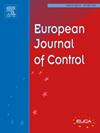Robust sampled-time control for a class of constrained nonlinear systems: An interval predictor-based MPC approach
IF 2.5
3区 计算机科学
Q2 AUTOMATION & CONTROL SYSTEMS
引用次数: 0
Abstract
The aim of this study is to design a robust sampled-time controller to stabilize continuous-time nonlinear systems, taking into account state and input constraints, and external disturbances. The proposed strategy is based on two essential components: an interval predictor–based state–feedback controller and a Model Predictive Control (MPC) approach, which deals with the state and input constraints. The interval predictor–based state–feedback controller is designed such that a safe set is provided, where the state constraints are not violated. Such a safe set characterizes the region where the MPC is activated, i.e, out of this set, guaranteeing the fulfillment of the state and input constraints. The proposed switched control strategy ensures the Input–to–State practical Stability of the considered nonlinear systems with respect to external disturbances. To compute the controller gains, a constructive method based on linear matrix inequalities (LMIs) is proposed and the state of the system is not required. The feasibility of the proposed scheme is illustrated by some simulation results.
一类约束非线性系统的鲁棒采样时间控制:一种基于区间预测的MPC方法
本研究的目的是设计一个鲁棒的采样时间控制器来稳定连续时间非线性系统,考虑状态和输入约束以及外部干扰。该策略基于两个基本组成部分:基于区间预测器的状态反馈控制器和处理状态和输入约束的模型预测控制(MPC)方法。基于区间预测器的状态反馈控制器设计了一个不违反状态约束的安全集。这样的安全集表征了MPC被激活的区域,即在这个集合之外,保证了状态约束和输入约束的实现。所提出的切换控制策略保证了所考虑的非线性系统相对于外部干扰的输入-状态实际稳定性。为了计算控制器增益,提出了一种不需要系统状态的基于线性矩阵不等式(lmi)的构造方法。仿真结果说明了该方案的可行性。
本文章由计算机程序翻译,如有差异,请以英文原文为准。
求助全文
约1分钟内获得全文
求助全文
来源期刊

European Journal of Control
工程技术-自动化与控制系统
CiteScore
5.80
自引率
5.90%
发文量
131
审稿时长
1 months
期刊介绍:
The European Control Association (EUCA) has among its objectives to promote the development of the discipline. Apart from the European Control Conferences, the European Journal of Control is the Association''s main channel for the dissemination of important contributions in the field.
The aim of the Journal is to publish high quality papers on the theory and practice of control and systems engineering.
The scope of the Journal will be wide and cover all aspects of the discipline including methodologies, techniques and applications.
Research in control and systems engineering is necessary to develop new concepts and tools which enhance our understanding and improve our ability to design and implement high performance control systems. Submitted papers should stress the practical motivations and relevance of their results.
The design and implementation of a successful control system requires the use of a range of techniques:
Modelling
Robustness Analysis
Identification
Optimization
Control Law Design
Numerical analysis
Fault Detection, and so on.
 求助内容:
求助内容: 应助结果提醒方式:
应助结果提醒方式:


